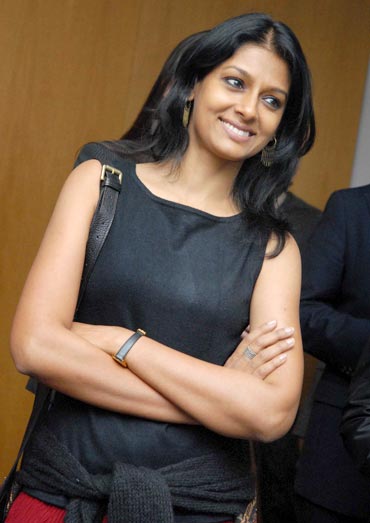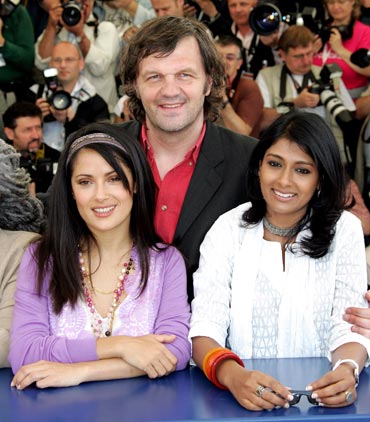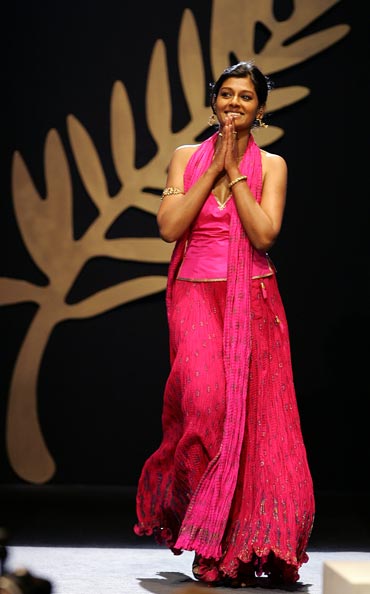
That Nandita Das is an internationally acclaimed actor and filmmaker is a well-known fact. But there is another side to this versatile personality that not many are aware of.
An MA in Social Work from Delhi School of Social Work, Nandita has extensively toured across India, interacting with India's youth, understanding their concerns, their aspirations and their dreams.
In March this year the World Economic Forum recognised Nandita as one of the Global Young Leaders from around the world for her professional achievements, commitment to society and her potential to contribute to the future of this world.
"Of course, when you are given an award you are happy. But that's not your motivation, that's not why you work," says Nandita.
But when the World Economic Forum informed her about being one amongst the 197 Global Young Leaders the ever-humble Nandita told them that she was not eligible for it.
As an actor she did films like Fire, Earth, Bawander which were not only critically acclaimed but also had their share of controversies.
Never the one to shy away from controversial issues, Nandita spoke to Prasanna D Zore on a wide range of issues.
In the first part of this interview, Nandita spoke about the rural-urban divide amongst India's youth, their aspirations and their dreams, as well as their struggles and challenges in the 21st century.
Has this honour increased your responsibilities towards India's youth?
I have very much crossed the youth stage really. So when they (the awards jury) first wrote to me I told them I am not eligible for it.
Why would you say that?
Actually all of us are growing older but feeling very young. In that sense, at some level I definitely relate to the youth. I do a lot of talks in colleges and that's my primary focus and I do feel very connected with India's youth.
But I don't think an award makes you more or less responsible. I have always held strongly that young people in India don't get enough guidance, open spaces where they can brainstorm about issues. They have many questions but nobody really there to answer them. They are being influenced by all kind of things like media, societal or family pressure.
Whenever I get an opportunity to interact with young people I thoroughly enjoy it. The candidness with which they talk, ask questions, share their dilemmas, and I share my experiences, I have always enjoyed that.
What kind of insights did you get about India's youth in your various interactions with the youth across the country? What does India's youth want, what are their aspirations?
To be honest I've had more interesting conversations whenever I interacted with small town young people or even in less exposed colleges in big cities.
When you go to a very privileged institution it is sad that there is lot more cynicism. There is lot more removal from the reality. You create your own little world. And they are not in isolation which is a reflection of the society in general.
The upper urban class in India is fairly removed from the realities of the country and world. You get into your own little world and think that's what exists.
The rural pages in urban newspapers are vanishing. Rural news comes in only when there's something scandalous. Otherwise we don't really get to know what's happening in rural India.
I have widely seen that there is fading of idealism. In my college days I was totally idealistic and still am foolishly (laughs). In my times idealism was seen as a good thing but today it's seen as a foolish thing to be.
Idealism is what propels you, motivates you. It's like wanting to dream. If you don't dream you have nowhere to go.
I had been to Madhubani, a small town in Bihar for 60 years of IPTA celebrations. It is about six hours from Patna. The level of enthusiasm amongst young people, the kind of faith they had that they were going to change the world with their plays, work or activities, the kind of idealism they showed, their desire to participate in social processes was much more than if you go to a much privileged institute where they are talking more about money and jobs.

In essence does a divide exist between the country's rural and urban youth?
I wouldn't say only rural but rather between the advantaged and the disadvantaged.
Because in a big city too you have people who are disadvantaged. Secondly, the young people in India are confused. They don't have enough forums where their questions can be answered to satisfaction.
They don't have relationships with their parents, teachers, peers where they can really get answers to their deeper dilemmas.
Was the economic liberalisation that began in 1991, in a way responsible for fading of idealism amongst India's urban youth? Did it make them more materialistic?
I am sure there is some connection (between the two). Because even the West has gone through the whole cycle of materialism and now looking for spirituality or something else that can replace (the bad impact of materialism) it. We have obviously not learnt enough from them.
I think a certain amount of economic liberalisation was inevitable, is also needed for a country to grow but not at the cost of creating a larger divide between the rich and the poor which has happened in India.
The extremely poor people in India are slightly better off compared to what they were 20 years ago but the gap between the rich and poor has increased manifold.
In terms of idealism, and I don't want to give a very cynical picture because there are still a lot of young people who I meet are absolute gems, who in their own way are trying to make a difference. Though smaller in number but for that I don't think I need to blame them because it's just that nobody encourages idealism (in India's youth) today.
If there were some idealistic young people in India there would be 20 other people to pull them down.
If somebody in her/his college were to say that they are taking a year off after graduation to work with the disadvantaged there would be scores of people saying why unnecessarily waste a year.
When I took one year off after my graduation a lot of people, including my parents, actually appreciated it. I think India is a very complex country and one can never generalise about India.
What, according to you, are the challenges India's youth face in the second decade of the 21st century? Are we ready for them?
We are a very young country. We do have a very huge young community. Challenges are manifold. For instance, in the field of education, do we have enough institutes, does the disadvantaged community get a chance to reach where the others (privileged) are?
There is reservation but that again is a faulty system. We need more affirmative action where people who have been left out because of historical and social reasons need to come at par with others.
A lot of rural youth does not want to do farming or rural work because there are less and less takers for it.
Unemployment is a huge issue with a lot of young people. So when we talk of young people we talk of a spectrum of young people.
Affluent young people and poor young people have completely different struggles. For an affluent young person a struggle is not getting the best college in the US.

Is inclusion of caste in census an affirmative action?
Ideally no. Whenever I see a form which has space for religion or caste, I feel offended. A lot of young people mention their caste in their resume also. I mean what is the relevance of caste here. But the reality is, that unfortunately caste and religion -- now even region and language -- does play a big role.
But then a lot of young people are attracted to the politics of chauvinism, language, caste and religion these days?
This is a global phenomenon. When people do not have anything to hold on to, when they have a loss of sense of identity, when basic amenities are not there then it is easy to get them emotionally excited about something that they can hold on to, something that they can call their own, where they can identify with something.
The young would any day choose the more sustainable, life-giving option than getting into the politics of language, caste or religion. The reason they don't is because they are nameless, stateless people with no sense of identity. When you make them feel so miserable the only way in which they can grab attention is by asserting their identities.
A lot of young people are brainwashed into believing that this (caste, religion, region, language) will give them some sense of self-worth.
In your various interactions throughout the country with young people did you come across a feeling that Indian youth are getting communalised?
If Indian youth had been largely communal, then the government (the Congress-led UPA) would not have come to power.
I think basically human beings are not communal. Indian youth is also not communal. They just want to get along with their life and survive. But when there is that emptiness, when there is nothing to latch on to and they are given the bait that they have something to be proud of, they start getting communal.
Of course, we have a history of divide and rule. But we all are basically good people and instead of fighting against just the communal forces we should create more positive energy, understand the merits of a pluralistic society, which is what we are.
A majority of Naxal cadres are the tribal youth? Even the Salwa Judum has young tribal people in their ranks? What attracts youth to violence?
Youth has lot of idealism. They also want to make a difference. But youth can also be misguided.
When the Naxalbari movement started in Bengal there were a lot of rich youth who actually questioned the system and wanted to join such a movement because they felt they needed to change the system.
I am personally completely against violence. Violence can only beget more violence. While violence is not the means to an end one has to go deeper into the root cause of such things.
The fact is if you see where the Naxalite movement has gathered strength in our country is a belt of very underprivileged, disadvantaged people. These people have suffered for so many years, where development has not happened, where there is huge potential of mining but corporates have mined the areas completely dry.
So there are lot of root causes why people here resort to violence. When people have nothing to hold on to, when they are down in the dumps, the only way they are taught, unfortunately, is by telling them to take the gun.
But who are the ones who are joining the Naxalites or the Salwa Judum or even the CRPF? The sad thing is that we are making innocent people fight more innocent people. They are actually part of the same group who have resorted to violence to resolve a situation. But by violence you can never really solve anything.
Do you think Rahul Gandhi could be the answer to the problems faced by India's youth? A few days ago Prime Minister Manmohan Singh said that he can takeover whenever the Congress party decides.
You are asking me all kinds of questions under the sun.
I think he is a young, dynamic person. He seems sensitive reaching out to people but only time will tell. Everything is not about charisma and about what is being promoted.
I don't want to sound too cynical but it's not just Rahul Gandhi but lot of young people out there. We focus only on one person because that party has a certain legacy. But that should not be taken away from him either because that's not a black and white issue.
He as an individual has to prove his mettle. Till now, from whatever media coverage I have seen, it seems like he wants to reach out to the young people and wants to change a certain system. But like him there are many others and we should encourage all of them.
Could you name some 5 people who have the potential to inspire India's youth and help channelise their energies for building a new India?
Unfortunately the names that are available are all in politics pretty much because of their family. So it would be wrong to name anybody.
I am sure there is lot of youngsters out there in different parts of India who are driven, committed and who have the potential to inspire the country's youth. But they are not popular, not in the media gaze so we don't know they exist.
Why give unnecessary attention to some people who really don't deserve it by naming names.
Unfortunately, our democratic process is not mature enough to allow somebody from a poor background to come up and take a leadership position.